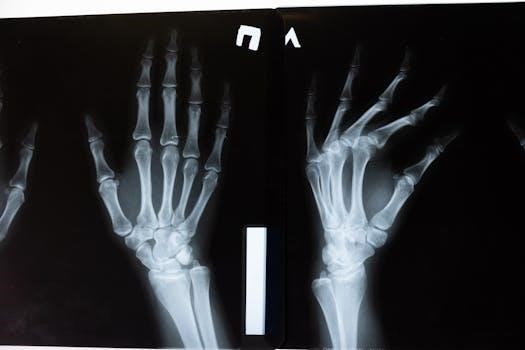
salvage the bones pdf
Overview of Salvage the Bones
Salvage the Bones, set on Mississippi’s Gulf Coast, tells the story of fourteen-year-old Esch and her family in the twelve days surrounding Hurricane Katrina’s landfall. They live in the fictional town of Bois Sauvage on a patch of land.
Setting and Timeframe
The novel Salvage the Bones unfolds in the rural, fictional Mississippi town of Bois Sauvage, a place where life is intertwined with the harsh realities of nature and poverty. The story is firmly rooted in the year 2005, specifically during the twelve days leading up to, during, and immediately after the catastrophic landfall of Hurricane Katrina. This timeframe is crucial as it heightens the tension and underscores the vulnerability of the characters against the backdrop of an impending natural disaster. The setting, a marginalized community along the Gulf Coast, adds another layer of complexity, highlighting the impact of both the storm and the socioeconomic conditions on the lives of the Batiste family. The landscape itself becomes a character, reflecting both the beauty and the brutality of the environment they inhabit. The novel captures the essence of a specific time and place, making the reader feel the palpable threat of the storm.
Main Characters
The narrative of Salvage the Bones centers around the Batiste family, a working-class African-American family residing in Bois Sauvage. At the heart of the story is Esch, a fifteen-year-old girl who serves as the novel’s narrator, offering a unique perspective on their lives. Her father, Claude, is a central figure, portrayed as a man deeply aware of the impending hurricane and trying to prepare his family. Esch’s brothers are also crucial⁚ Randall, with his basketball aspirations; Skeetah, deeply connected to his pitbulls; and the youngest, Junior, who lost his mother at birth. The family’s dynamics are shaped by their shared struggles and their resilience in the face of adversity, as well as their individual hopes and desires. The absence of the mother and their poverty contribute to the overall feel of the novel. These characters form the core of the story.
Plot Summary
Salvage the Bones unfolds in the twelve days leading up to and following Hurricane Katrina’s devastating impact on the Mississippi Gulf Coast. The story follows the Batiste family as they navigate the challenges of poverty and impending disaster. The family’s father, Daddy, works to prepare their home, while Esch grapples with her own pregnancy. Esch is the narrator of the story, and she shows the reader her life, the lives of her brothers and her father. Skeetah, meanwhile, is preoccupied with his pitbulls, and Randall dreams of basketball. The family is working through the storm, and as the hurricane hits, they must do what they can to survive. The novel culminates in the storm’s aftermath, where the family’s home is destroyed, but they remain together, a testament to their resilience. Esch faces her future as a mother, and their lives have changed completely.

Themes in Salvage the Bones
Salvage the Bones explores themes of poverty and resilience, highlighting the strength of family bonds amid hardship. The novel also depicts the impact of Hurricane Katrina on the characters and their community.
Poverty and Resilience
Salvage the Bones vividly portrays the harsh realities of poverty experienced by the Batiste family in rural Mississippi. The novel depicts their daily struggles with limited resources and a lack of opportunities, highlighting the systemic disadvantages they face. Despite their difficult circumstances, the family demonstrates remarkable resilience, finding strength within their relationships and community. The characters navigate their challenging environment with resourcefulness and determination, showcasing their ability to endure hardship. They are forced to make difficult choices to survive, constantly battling against their circumstances, but never losing hope. Their struggles reflect the experiences of many marginalized communities, emphasizing the importance of family and community support in overcoming adversity. The novel underscores their ability to salvage what they can from their lives, demonstrating their powerful spirit in the face of great hardship. They show that poverty does not define them, but rather shapes their resilience.
Family Bonds
The novel Salvage the Bones places a strong emphasis on the intricate family bonds that tie the Batiste family together. Despite their individual struggles and conflicts, the family members rely on each other for support and survival, particularly as Hurricane Katrina approaches. The strong bond between siblings, Esch, Randall, Skeetah, and Junior, is a key aspect, as they navigate adolescence and prepare for the storm together. The absence of their mother creates a void, but they find solace in their connection to one another. Daddy’s role as the head of the family is complex, encompassing both strength and vulnerability, highlighting the challenges of single-parenthood. The novel underscores that family is a source of love, protection, and resilience, especially in the face of adversity. They are a unit, bound by shared experiences and a deep sense of loyalty, demonstrating the importance of kinship in the face of turmoil. Their unwavering support of each other proves to be essential for their survival.
Hurricane Katrina’s Impact
Hurricane Katrina serves as a powerful and destructive force in Salvage the Bones, profoundly impacting the lives of the Batiste family and the community of Bois Sauvage. The novel meticulously depicts the days leading up to the storm, heightening the sense of dread and anticipation. The storm’s arrival brings devastation, destroying homes and disrupting lives, highlighting the vulnerability of those living in poverty. The hurricane exposes the fragility of their world, forcing them to confront the raw power of nature. The aftermath reveals the full extent of the destruction, leaving the family to salvage what they can from the wreckage. The storm is not just a physical event; it also has a deep emotional and psychological impact on the characters, testing their resilience and their bonds. The experience becomes a defining moment in their lives, shaping their understanding of themselves and their community. The hurricane’s effect is a testament to its power.

Literary Aspects
Jesmyn Ward’s novel uses a teen’s perspective to show how a Black Mississippi family endured poverty, violence, and Hurricane Katrina. The narrative style enhances the story, giving it a raw and emotional feel.
Narrative Perspective
Salvage the Bones is narrated through the eyes of Esch Batiste, a fifteen-year-old girl living in rural Mississippi. This first-person perspective provides an intimate and immediate look into her thoughts, feelings, and experiences as she navigates the complexities of poverty, family dynamics, and the impending threat of Hurricane Katrina. The reader is privy to Esch’s internal struggles, her coming-of-age journey, and her observations of the world around her. Her voice is raw, honest, and often poetic, reflecting both the harsh realities of her life and her resilience. This unique viewpoint allows the reader to deeply empathize with her and her family’s situation, experiencing the events of the novel through her distinct lens. The limited perspective also creates a sense of suspense as the reader is only aware of what Esch knows or perceives, making the impact of the hurricane and its aftermath even more powerful. Furthermore, Esch’s narrative provides a crucial insight into the lives of a marginalized community, offering a perspective often overlooked in mainstream literature.
Jesmyn Ward’s Writing Style
Jesmyn Ward’s writing style in Salvage the Bones is characterized by its lyrical prose and powerful imagery, which vividly portrays the lives of the Batiste family and the landscape of Bois Sauvage. Her use of figurative language, including metaphors and similes, adds depth and texture to the narrative, creating a rich and immersive reading experience. Ward’s writing is often described as both poetic and muscular, reflecting the harsh realities of poverty and violence, while also highlighting the beauty and resilience of the human spirit. She masterfully blends the vernacular of the characters with evocative descriptions, crafting a distinct and authentic voice. Furthermore, her style is marked by a sense of urgency and immediacy, drawing the reader into the turbulent days leading up to Hurricane Katrina. Ward does not shy away from depicting the brutal aspects of life, but she also celebrates the enduring power of family and community. Her writing is emotionally resonant, leaving a lasting impact on the reader.

Reception and Awards
Salvage the Bones received significant critical acclaim, culminating in Jesmyn Ward winning the 2011 National Book Award for Fiction. This recognition solidified its place as a powerful and important work of literature.
Critical Acclaim
Salvage the Bones garnered widespread critical praise for its unflinching portrayal of poverty and resilience in the face of impending disaster. Jesmyn Ward’s powerful and poetic prose was lauded for its ability to immerse readers in the lives of the Batiste family. Reviewers highlighted the novel’s raw emotional honesty and its depiction of the harsh realities of rural Mississippi. Many critics acknowledged the novel’s ability to tackle complex issues like race, class, and the impact of natural disasters with sensitivity and depth. The narrative perspective through the eyes of a teenage girl, Esch, was considered particularly effective, offering a unique and compelling voice. The book’s unflinching look at the challenges faced by the family, combined with its poetic language and strong character development, contributed to its positive reception. Its capacity to resonate with readers on a deeply emotional level was frequently noted, cementing its place as a significant work of contemporary literature. Critics also praised Ward for creating a story that was both heartbreaking and hopeful, demonstrating the resilience of the human spirit amidst tragedy.
National Book Award
Salvage the Bones received significant recognition when it was awarded the National Book Award for Fiction in 2011. This prestigious honor solidified the novel’s place in contemporary American literature and brought increased attention to Jesmyn Ward’s work. The award committee praised the novel for its powerful storytelling, its portrayal of a family grappling with poverty and an impending hurricane, and the unique voice of its narrator, Esch. The National Book Award win was a pivotal moment for Ward, establishing her as a major literary voice. The recognition also highlighted the importance of stories about marginalized communities and their experiences in the face of adversity. The award further underscored the novel’s impact on readers and critics alike, cementing its place as a thought-provoking and emotionally resonant work. The honor served as a testament to the book’s exceptional literary quality and its ability to delve into complex social issues with grace and depth. This award significantly amplified the novel’s reach and readership, solidifying its status as a modern classic.

Significance of the Title
The title, Salvage the Bones, refers to the characters’ efforts to rescue something valuable from their challenging lives amid poverty and an approaching hurricane. It symbolizes hope and resilience in the face of adversity.
Symbolism of “Salvage”
The word “salvage” in the title embodies the characters’ desperate attempts to rescue what they can from their lives, which are marked by poverty and the looming threat of Hurricane Katrina. It represents their struggle to find value and preserve what is important amid chaos and destruction. The act of salvaging suggests a proactive approach to adversity, highlighting the family’s determination to not be completely overcome by circumstances. This idea is directly linked to their material possessions, their family bonds, and even their own senses of self. They try to salvage hope, love, and connection in a world that seems set on taking it all away. “Salvage” also reflects a form of resilience, a refusal to give in, and a fight to recover something meaningful from what appears to be a hopeless situation. It’s a testament to the human spirit’s capacity to endure and find value even in the most dire circumstances.
Symbolism of “Bones”
The word “bones” in the title carries a multi-layered symbolism, representing the bare, essential structures of life that remain after everything else is stripped away. It signifies the fundamental aspects of existence, such as family, history, and identity, which persist despite challenges. Bones can also represent the physical remnants of what was, the skeletal frame upon which life is built. In the context of the novel, it may symbolize the fragile yet enduring nature of the family’s relationships and their ancestral ties to the land. Furthermore, “bones” can evoke the fragility of life and the harsh realities of poverty and survival. It suggests the strength found in vulnerability and what remains after loss and devastation. The bones are the core, the essential, the things that cannot be taken away even by a hurricane or poverty, showing the strength and perseverance of the human spirit.